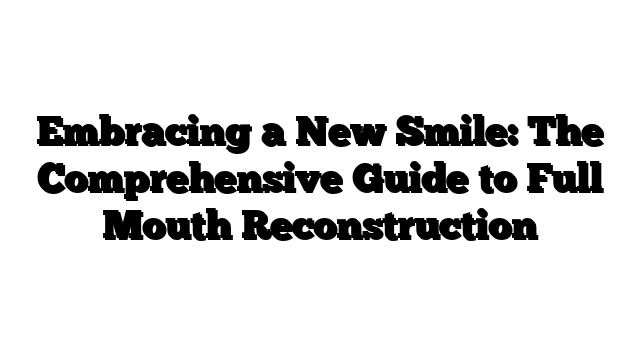Table of Contents:
- Key Takeaways
- Introduction to Full Mouth Reconstruction
- Evaluating the Need for Full Mouth Reconstruction
- The Steps of Full Mouth Reconstruction
- Advances in Dental Technology and Techniques
- Preparing for Your Full Mouth Reconstruction
Key Takeaways:
- Understanding what full mouth reconstruction involves and who it benefits.
- Modern dental technology plays a significant role in improving outcomes.
- Mental and emotional implications of undergoing such a transformative dental procedure.
- Addressing common concerns and questions about the whole mouth reconstruction process.
Introduction to Full Mouth Reconstruction
A beautiful smile can be a cornerstone of confidence, and with advances in dental medicine, achieving this has never been more attainable. Full mouth reconstruction is a term that encompasses a broad scope of dental procedures to thoroughly restore not just the cosmetics of one’s smile but also functional integrity and oral health. Those who opt for dental restoration in Los Angeles find this extensive procedure to improve their smile’s aesthetics, alleviate pain, and restore function previously lost due to dental issues.
This complex treatment is generally recommended for individuals with extensive oral health issues, including but not limited to extensive tooth decay, severe gum disease, or teeth that are worn down due to bruxism or other conditions. The endeavor of full mouth reconstruction is multifaceted. While improving oral health, it also aims to enhance the patient’s overall quality of life by tackling issues that may cause pain and discomfort or hinder daily activities such as eating and speaking. In essence, it’s not just about crafting a new look—it’s about crafting a new way of life with enhanced well-being.
Interestingly, this transformative process impacts oral health and can improve general health. Poor dental health can be related to malnutrition, headaches, and even sleep apnea, and full mouth reconstruction may contribute to resolving such conditions.
Evaluating the Need for Full Mouth Reconstruction
Full mouth reconstruction can be the answer to a myriad of dental woes. It’s an extensive treatment plan focusing on severe cases that cannot be resolved with simple, one-procedure solutions. Ideal candidates include patients suffering from extensive dental damage due to chronic conditions like acid reflux or dry mouth, those with multiple missing teeth, and those with severe erosion. Determining the necessity of such an all-encompassing procedure involves a precise diagnosis. This process typically begins with meticulous dental examinations, including detailed imaging techniques such as panoramic radiographs and 3D scans.
A candid discussion with a dental professional, addressing the patient’s expectations and functional and aesthetic goals, is paramount in formulating a personalized full-mouth reconstruction plan. The dental clinic on comprehensive care is a beneficial resource, providing a deeper insight into the exhaustive nature of such treatments and guiding patients on what to anticipate from the extensive nature of the procedures involved.
Understanding the financial aspects of full mouth reconstruction is also crucial, as it can be a significant investment in oral health. To make informed decisions, patients should inquire about insurance coverage, financing options, and potential out-of-pocket expenses. Additionally, considering the time commitment required for the reconstruction process is essential, as it may involve multiple appointments over an extended period. Ultimately, the decision to undergo full mouth reconstruction should be made collaboratively between the patient and their dental care team, weighing the potential benefits against the associated considerations.
The Steps of Full Mouth Reconstruction
The path to a renewed smile begins with a comprehensive dental health assessment to determine the patient’s complete mouth reconstruction requirements. After this initial step, a sequence of coordinated treatments is initiated, spanning various dental disciplines. These procedures can include periodontal therapy, endodontic treatments, orthodontics, and the application of crowns, bridges, or veneers. The entire mouth reconstruction process may also involve more advanced surgical interventions, such as dental implants or bone grafting, to provide foundational support for new dental structures.
A detailed and individualized treatment plan is crucial since each patient’s needs are unique. Treatment may unfold in several stages, and depending on the complexity and number of interventions required, full mouth reconstruction can span several months to a few years. The deliberate pacing ensures each stage of healing is complete before progressing to the next, promoting the best possible outcomes for long-term dental health and function.
Advances in Dental Technology and Techniques
The advent of new materials and futuristic dental technologies has immensely influenced full-mouth reconstruction. Ceramic and composite materials now bring a natural look and feel to reconstructions, while durable metals provide underlying strength where necessary. The right choice of materials is a critical decision point in the process, directly impacting the longevity and appearance of the final results.
Modern dental technology advances offer a more refined approach to full mouth reconstruction. For instance, digital impressions and computer-aided design and manufacturing (CAD/CAM) techniques have introduced a new level of precision in dental prosthetics. Also, online resources help to understand the role of digital dentistry as it provides patients with faster and more accurate results, contributing to better overall outcomes.
Preparing for Your Full Mouth Reconstruction
Preparing for a full mouth reconstruction is as essential as the procedures themselves. It is a period that can involve mentally preparing oneself and physically for the transformative journey ahead by adhering to the presurgical instructions provided by the dental surgeon. Employing stress-reduction techniques and obtaining moral support from friends or family can also significantly ease the emotional journey. Pre-operative consultations often cover fundamentals like nutrition, smoking cessation, and adjustment of certain medications, aiming to optimize the body’s ability to heal post-surgery.
James Martin is a passionate writer and the founder of OnTimeMagazines & EastLifePro. He loves to write principally about technology trends. He loves to share his opinion on what’s happening in tech around the world.



